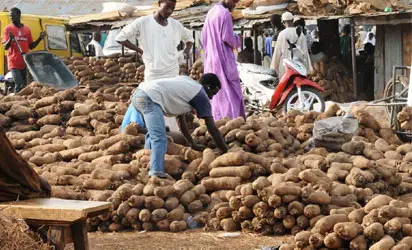News | Events | Digital PR | Advertising
Nigeria’s Inflation Hits 34.60% in November 2024, Driven by Rising Food Prices

Nigeria’s inflation rate increased to 34.60% in November 2024, up from 33.88% in October, marking a 0.72 percentage point rise, according to the Consumer Price Index report released by the National Bureau of Statistics (NBS).
This represents a significant year-on-year increase, as the November 2024 rate is 6.40 percentage points higher than the 28.20% recorded in November 2023.
Food Prices Drive Inflation
The surge in inflation is primarily attributed to rising food prices, which have continued to strain Nigerian households. Food inflation reached 39.93% in November 2024, compared to 32.84% in November 2023. Staples like yam, rice, maize, and palm oil saw steep price hikes, along with other items such as guinea corn, millet, and meat.
Month-on-month food inflation rose slightly to 2.98% from 2.94% in October. The 12-month average food inflation rate now stands at 38.67%, up from 27.09% in the previous year.
Core Inflation on the Rise
Core inflation, excluding food and energy prices, climbed to 28.75% in November 2024, up from 22.38% in November 2023. This reflects rising costs in transportation, housing, and personal services, with taxi fares, bus rides, rents, and grooming services seeing the sharpest increases.
Month-on-month core inflation declined slightly to 1.83% from 2.14% in October, but the 12-month average rose to 26.64% from 20.35% in November 2023, signaling broader economic pressures.
Regional and Urban-Rural Disparities
Inflation rates varied across regions. Bauchi (46.21%), Kebbi (42.41%), and Anambra (40.48%) recorded the highest year-on-year rates, while Delta, Benue, and Katsina had the lowest, ranging between 27.47% and 29.57%.
Food inflation was highest in Sokoto (51.30%), Yobe (49.69%), and Edo (47.77%), while Kwara (31.39%), Kogi (32.95%), and Rivers (33.27%) recorded slower increases.
Urban inflation in November stood at 37.10%, higher than rural inflation at 32.27%. Month-on-month, urban inflation rose by 2.77%, while rural inflation increased by 2.51%.
Economic Impact
The persistent rise in inflation underscores the challenges faced by Nigerian consumers and businesses, as the cost of living continues to escalate. The government faces mounting pressure to address food supply chain disruptions, rising production costs, and other economic inefficiencies contributing to inflationary pressures.
Explore more
Scientists Research Nigeria’s Okra, Maize, Four Other Crops During NASA’s Space Mission
International astronauts will research six indigenous Nigerian crops and seeds during the...
President Trump Orders Pharmaceutical Companies To Cut Drug Prices Within 60 Days
President Donald Trump on Thursday said he asked major pharmaceutical companies to...
Microsoft To Become The Next $4 Trillion Company
Microsoft (MSFT.O), opens new tab soared past $4 trillion in market valuation...
Importers Slash Petrol Prices Below Dangote Rates Amid Rising Market Competition
Competition has hit Nigeria’s petroleum sector as fuel importers slash petrol prices...












Leave a comment